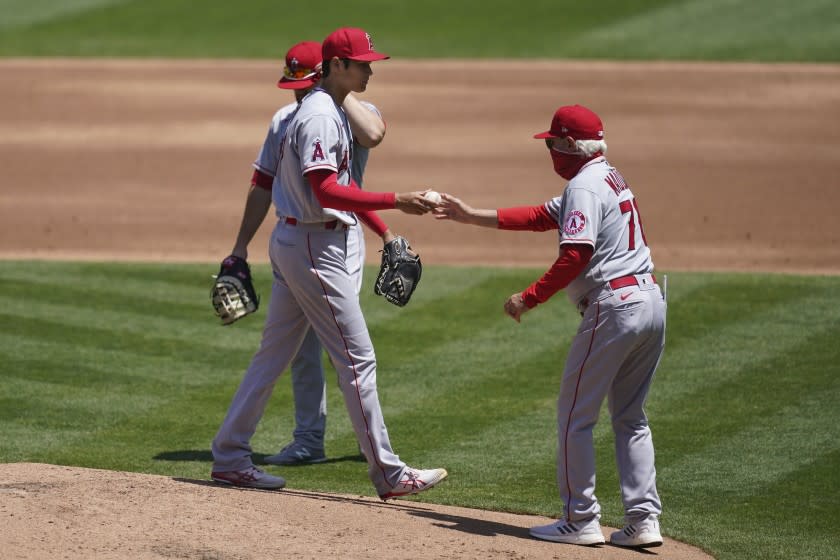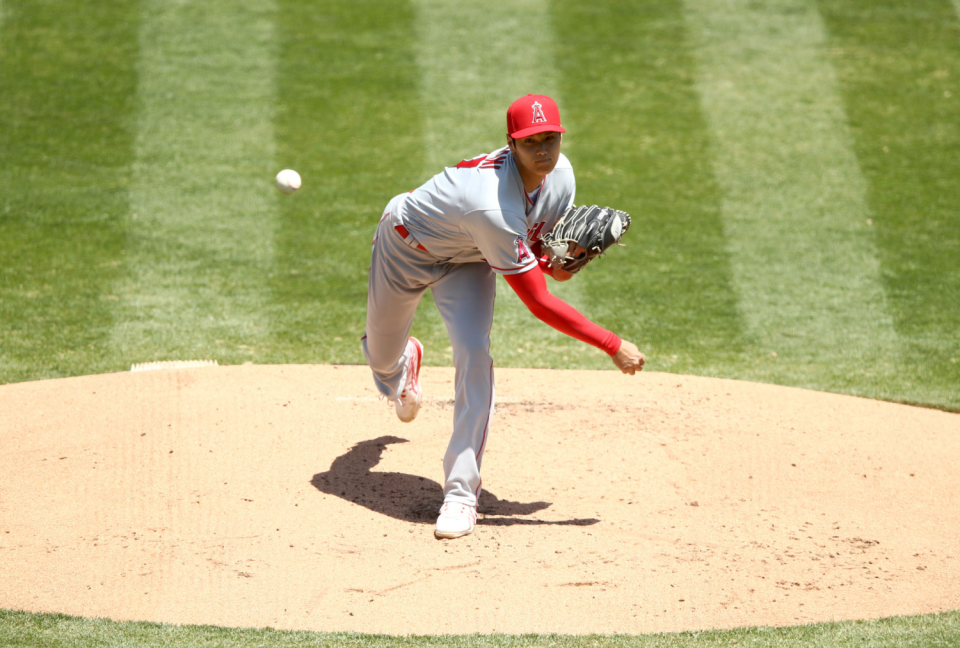Hernández: It's clear Shohei Ohtani is facing the greatest challenge of his career

Before Shohei Ohtani pitched his first game in nearly two years, Angels manager Joe Maddon declared there were no limits to what the two-way marvel could do.
Maddon was right.
In the wake of a 6-4 loss to the Oakland Athletics on Sunday, Ohtani has an earned-run average of infinity.
Almost 22 months removed from reconstructive elbow surgery, Ohtani returned to a major league mound, but only in a literal sense — and that’s not a commentary on the dump of a stadium the Athletics call their home.
Ohtani still isn’t back.
He faced six batters and couldn’t retire any of them, departing from the game with his team down 4-0. He was charged with a fifth earned run when reliever Matt Andriese forced Vimael Machin to ground into a double play.
The majority of his fastballs were in the 92-to-93-mph range, according to Major League Baseball’s Pitchf/x system. His fastest pitch was clocked at 94.7 mph, well under the triple-digit threshold he routinely broke as a rookie two seasons ago.
Recovering from this meltdown — or, more precisely, from this elbow operation — could be the greatest obstacle Ohtani has encountered in his career.
His transitions from high school to Japan’s professional league to the majors were seamless, his physical gifts ensuring he would succeed at every stage.
About the most uncertainty he has ever encountered was in his first spring training with the Angels when he didn’t pitch or hit well in exhibition games, resulting in speculation he could start the season in minors. Even then, Ohtani knew the Angels backed him. He also knew he didn’t play well in exhibition games in Japan either. And as soon as the games started counting, Ohtani started looking like the player he was for the Nippon-Ham Fighters.
This is different.
The same body that was the source of his confidence has now been surgically modified.
“Coming off a severe injury, getting a chance to compete for the first time in a while, there’s mental adhesions to break through to get to the point where you had been,” Maddon said. “And I’ve seen this with other guys before. This is nothing new.”
An interpreter wasn’t required to help Maddon figure that out.
In each of his previous starts, including the 82 he made over five seasons in Japan, Ohtani pitched from the third base side of the pitching rubber. On Sunday, he was on the opposite end.

He also looked and sounded shaken in a postgame Zoom webinar.
Ohtani described feeling off, almost as if he encountered trouble locating the emotional and mental spaces he typically enters when playing a regular-season game.
“I think I wasn’t able to let my arm go entirely,” he said in Japanese.
Why was that?
Ohtani said he couldn’t grasp a “feel for the game.”
“I was focused more on throwing the ball than on feelings of trying to get the hitter out,” he explained.
Maddon was confident the problems weren’t physical, pointing to how Ohtani touched 97 mph in intrasquad games.
“Believe me,” Maddon said, “health-wise, he’s fine.”
That made this less of a concern, but not by much, at least in the context of a pandemic-shortened season.
Maddon called for patience on Ohtani’s behalf, but the reality is the Angels have only 57 more games.
Asked whether the Angels would consider skipping Ohtani’s next turn in the rotation to allow the Japanese right-hander to pitch in an intrasquad game against inactive players in their Long Beach camp, Maddon said he hadn’t thought ahead to that point. But Maddon already had some thoughts about Monday. While Ohtani usually doesn’t play the day after he pitches, his start was brief enough for Maddon to consider employing him as a designated hitter in the series finale in Oakland.
Ohtani prefers to alternate between hitting and pitching compared with what he did last season when he was used exclusively as a designated hitter as he recovered from surgery. He said switching roles allows him to forget about the bad games.
He sounded as if he were counting on that again. Asked whether he could recover from this start, he replied: “There were some parts I obviously have to improve. But there are games starting tomorrow, so first I would like to change my mindset and focus on hitting.”
But he’s already failed in the batter’s box as well. In the season opener Friday, Ohtani batted with two outs and the bases loaded in a tie game. He struck out on three pitches, and the Angels went on to lose in extra innings.
This could be a fork in the road in the career of Ohtani, who came to the majors with the intention of becoming more than a two-way player in the world’s most competitive league. He wanted to become the best player in the game.
Before leaving Japan, he said at a news conference: “As long as you’re playing baseball, I think it’s natural to want to be the No. 1 player. That can be hard to measure. I think a player is happiest when fans, when people say, ‘He’s No. 1.’ I would like to work hard with the aim of becoming that kind of player.”
Until now, he was able to rely on the physicality and know-how that allowed him to effortlessly launch 500-foot home runs one day and fire 100-mph fastballs the next. If he wants to realize his ambitions, he will have to discover another form of strength, the one that emanates from the mind and heart.

